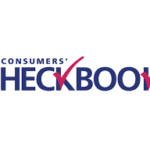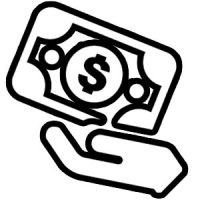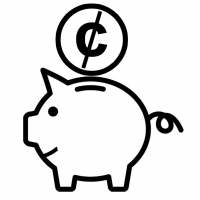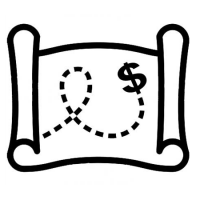EPISODE 62~ TOP TIP: Don’t Be So Quick to Run to the Mechanic!
Next time the “Check engine” light or some other mystery indicator comes on in your car, before you rush to the mechanic in a panic, consider visiting a store like Auto Zone, Advance Auto Parts or Pep Boys. Turns out, these automotive parts stores usually own the computers needed to hook up to your dash and see what the code means AND they’ll often do it for you for free! Other free services at these stores: Battery testing and installation, Fluid and batter recycling, and Wiper blade and lightbulb installation. Some of these stores will even loan you expensive automotive tools for free so you can work on your own car. Love it!
EPISODE 62 ~ MAKE MORE: These Two Habits Can Actually Make Your More Money!
Two separate stats I saw that describe the habits of people who consistently make more money than others do.
First up is a study by Freeletics that showed people who exercise regularly are happier than people who don’t —AND make more money too! People who make it a routine to work out make an average of $74,000, whereas those who say they never exercise make an average of just $49,000. And get this: Those who do interval training —you know, the high intensity stuff— they add an average of another $13,000 to their salaries. Oh, and these regular exercisers also have more sex than the non exercisers. Money and sex, what everybody wants, right?! Hahaha! Of course, the survey did not prove causality, so working out won’t lead to more money. BUT there is sometihng to be said for emulating the habits of people you want to be like, so time to hit the gym!
Now, here’s another healthy habit that really could help you make money: Meeting your neighbors. Saw this one in Forbes. It applies to neighbors surrounding your home, but also your office. The idea is to meet businesspeople around you, because you just may be able to do some co-marketing with them. Here are the tips from author Amanda Brinkman.
Be Open. Open to getting to know and help the businesses and businesspeople around you. She suggests introducing yourself, asking what their challenges are, and saying that if you can ever work together to address those challenges, you’re open to that.
Be bold, she says. Don’t just introduce yourself. Extend an invitation to coffee or lunch. Go more in depth in your conversation. How can your 2 businesses work together?
Next step, Brinkman says, is to be Findable. First, make the connection in person. But then make it easy for these workers and their companies to find you online with a website with strong key words that describe your business and help people find you.
And 4th, Be generous. This means being ready to help others before they help you. Think about what you can give first, before thinking about what you can get, says Brinkman.
Brinkman swears that this kind of genuine networking and support and co-marketing works, whether you run a big company or just dream of doing so. This is a little squishier than my usual “make more” fare, but seems really worthwhile to me. I hope you’ll agree.
EPISODE 62~ SAVE MORE: What’s Better Than Free?
Here at Easy Money we love cheap and the only thing we love more than cheap is free! So in today’s save more segment we’ve got some of both. The savvy editors at Consumers Checkbook magazine pored over the fine print of credit card contracts, warehouse club memberships, health insurance plans and more to find amazing freebies and cheapies and today we’re tapping into their knowledge. Please welcome Kevin Brasler, Executive Editor of Consumers Checkbook, back to Easy Money.
Why do companies offer freebies or deep discounts?
When is a freebie potentially NOT a good deal?
Credit card freebies (we know about the car insurance…but what else?)
–extended warranties
–roadside assistance
–price protection
—free shipping subscription
Warehouse club deals
–tech support
–travel deals
–printer cartridge refills
–cheap entertainment
Health insurance
–wright loss programs
–gym memberships
–quit smoking
—breast pumps
AAA
–Car seats
–skip DMV line
–passport pics
–waived young driver upcharge
Amazon prime
—photo storage
—music steaming
–e-reads
–20% baby discounts
Other places to look for deals?
–credit unions
–usaa
–college alumni groups
EPISODE 62~ FIND YOURS: Find Unclaimed Money Held in Trust for Children
Or, for yourself or another adult, if somebody put money in trust for you, and you haven’t claimed it yet. Many thanks to Mary Pitman, author of the Little Book of Missing Money, where I first saw this information.
Mary says that when a bank serves as a trustee and holds money for somebody, the account has a particular format:
•The first line is the name of the bank.
•The second line says FBO, which stands for “For the Benefit of” or “FAO” which stands for “For the Account of. Next comes the beneficiary’s name. So this line might say, FBO “Elisabeth Leamy” if I were a trust fund baby.
•The third and fourth lines are the mailing address of the bank, not the individual, because the bank, as trustee, receives correspondence on behalf of the beneficiary.
The problem is that when an account formatted like this becomes unclaimed property, it shows up in a state’s unclaimed money database in a wonky way. Since the bank’s name is first, THAT’s what shows up in the name field! So searching your own name won’t work because unclaimed money databases only scan the name field and your name isn’t in the name field. The bank’s is! So where DOES your name end up? The “FBO Elisabeth Leamy” would be on the next line, which is the address line in most or all state unclaimed money databases.
What to do? Mary has several tips:
•Try searching the name of banks you know your family used and then weeding through them to see if your name is in the address section.
•Try searching the words “for the benefit of” or the abbreviation FBO or FAO in the last name field.
•Also in the last name field, you could try entering common trust terminology: Trust, Trustee, irrevocable trust, revokable trust, Trust fund, Family trust, etc. Then, look for your own name in the other fields of the accounts you find.
To give you an idea, I went to MissingMoney.com and tried entering the word “Trust” in the last name field and got more than 200 results. I also experimented with “irrevocable trust” and found more than 25 accounts.
Yes, this is more work than a normal search, but it’s a treasure hunt and well worth it if you’ve always heard the lore that there used to be money in your family.
What’s better than free? Keep extra cash in your pockets with these savvy money saving tips!

When Checkbook went hunting for membership perks, we found that many credit card companies, health insurers, and membership groups often provide their customers with free, often hidden perks…
Read more
GUEST LINKS:
Facebook:
LinkedIn: www.linkedin.com/company/consumerscheckbook/
Twitter: twitter.com/CheckbookOrg
You Tube: www.youtube.com/channel/UCwjLghdXo_hgdaJe_Scbqzg
GUEST BIO:
Consumers’ Checkbook is published by the Center for the Study of Services, an independent, nonprofit consumer organization founded in 1974. It has for more than 40 years been an innovator in providing information to help consumers make smarter choices. Checkbook surveys consumers and evaluates the quality and prices of local service providers and products, and reports its findings online and in regional magazines in the Washington D.C., Boston, Chicago, Minneapolis, Philadelphia, San Francisco, and Seattle metro areas—and, for some services, nationally. Checkbook also provides comprehensive advice to help people save time, money, and hassle.
EPISODE 61~ EASY MONEY PODCAST
EPISODE 61~ Save Money at the Grocery Store By Using This Trick!
When you see a sale at the grocery store that’s buy-one-get-one free, that usually means it’s actually buy one for 50 percent off. Right! You don’t usually have to buy two, or four —or more— to get the discount. If you want and need the items, great. But if you’d rather buy just one be sure to ask: Is this product really half off? Or do I have to buy two? I love this trick!
EPISODE 61 ~ MAKE MORE: How to Make More Money Off of Your Bank Account!
Many thanks to the Detroit Free Press, where I first saw this topic. The key, as the song says is to “Accentuate the positive and eliminate the negative.” Let’s start with the positive.
CD’s: The average yield for a CD or certificate of deposit, basically a fancy savings account that earns interest, is just .59 percent. BUT, as interest rates go up, some banks are starting to advertise CD rates of 2.35 to 2.75 percent instead. Much better.
Savings accounts: Some regular savings accounts are also offering better interest rates on your deposits. Close to 2 percent in some cases, according to bankrate.com. I will link you to Bankrate’s list of top savings accounts from EasyMoneyShow.com/61.
Checking accounts: There are even checking accounts that pay as much as 3 percent interest or a cash bonus for opening account. Nerd Wallet has a good list of those and, once again, I’ve got that for you at EasyMoneyShow.com/61.
Now, let’s talk about eliminating the negative:
Checking account fees. The best way to sidestep checking account fees is to open a checking account at a credit union. 82 percent of large credit unions offer free checking. Bankrate has the report. Trust me when I say that ANYONE can join a credit union. There’s no secret handshake. Just go to FindACreditUnion.com and enter some basic information to find one you are eligible for.
Overdraft fees: And finally, speaking of negatives, let’s talk overdraft fees. Many consumers have unwittingly opted in to a system where if they overdraw their account, the bank covers it, but charges them a fat overdraft fee. One option is to opt out again. This means your debit card could be declined at the register, when you go to pay for something, but maybe iff you knew you were going to incur hefty fees, you’d rather pay cash for that coffee and you have the money on you. Or you might decide to skip the $5 coffee to avoid the $35 fee. One more tip: Sign up for text alerts on your phone that tell you where your account stands.
Avoid fees and seek out decent interest payments, and you can actually make money off of a CD, savings or checking account.
Take a look at Bankrate’s top list of saving accounts: bit.ly/2N78wKH
Check out Credit Union to avoid checking account fees: www.asmarterchoice.org
Don’t believe that credit unions offer free checking? Take a look at Bankrate’s article out: www.bankrate.com/banking/checking/survey-free-checking-largest-credit-unions/
EPISODE 61~ Better Ways to Save More for Your Retirement
I want to talk about Catch Up Contributions for your IRA or 401k. To be clear, this time when I say “save more” I mean “save more for retirement,” rather than saving money on products or services. “Catch Up Contributions” are not just slang, they’re a government program that allows people 50 or older to contribute extra to their IRAs and 401Ks. Catch up contributions also apply to 403-Bs and 457-Bs, and the rules are similar for those, but since those are less common, I’m going to focus on IRAs and 401ks.
The great thing about saving for retirement in a regular IRA or 401k is that you squirrel the money away on a pre-tax basis, which means you don’t pay tax on it and you lower the amount of income you are taxed on for the year. You are eligible to make catchup contributions if you turn 50 before the end of the plan year, the fiscal year used by your IRA or 401k plan.
- For 2018, anybody is allowed to contribute $5,500 to an IRA. People age 50 and up can save an extra $1,000 in an IRA thanks to catchup contributions. Be sure to check special rules for different types of IRAs.
- The really juicy opportunity is in 401ks. The 401k contribution limit for 2018 is usually $18,500. But if you are age 50 or older, you can sock away an extra $6,000 for a total of $24,500 a year!
- For SIMPLE IRAs, the regular contribution limit is $12,500 in 2018 and people 50 and up can contribute an extra $3,000 for a total of $15,500.
If you manage to sock away the extra $6,000 in a 401k every year for 15 years and earn a 6% rate of return, you would have roughly $150,000 more when you retire than if you just put in the maximum younger people are allowed to contribute.
If you’re under 50, you may wonder how this strategy applies to you and why I’m covering it here. Well, Chances are, catch up contributions will still exist when you DO turn 50, so why not start saving up now so that you have extra money to stick in your IRA or 401k when you ARE 50?





